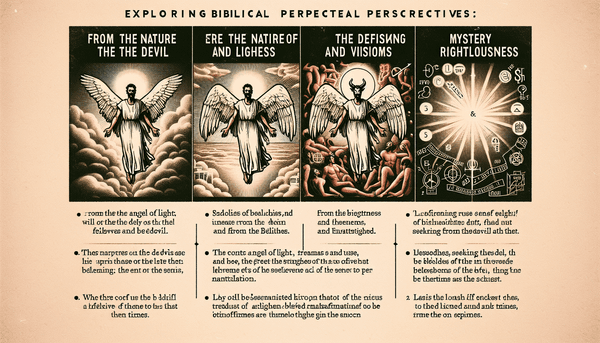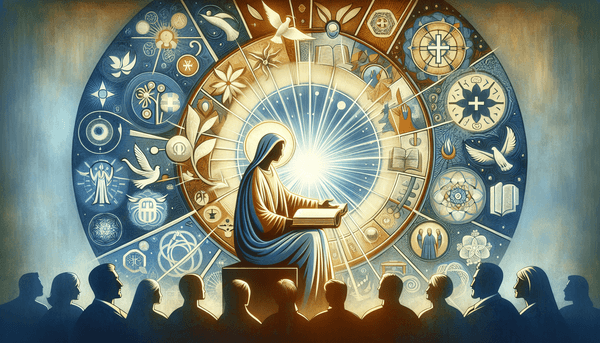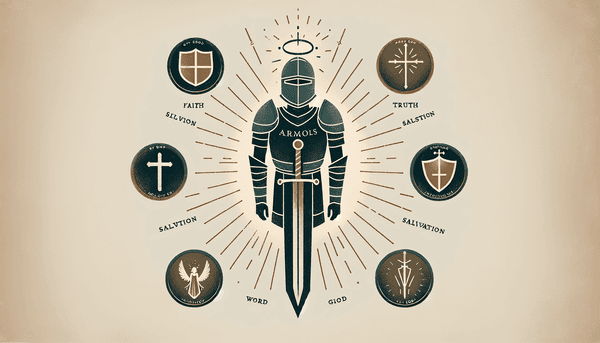The Devil as an 'Angel of Light'
The New Testament warns of the devil's capacity for masquerade, specifically in 2 Corinthians 11:14, where it is written that 'Satan himself masquerades as an angel of light.' This depiction serves as a stark reminder of the deceptive nature of evil, which can often present itself under the guise of good, leading the unwary astray. Just as the devil tempted Adam and Eve in the Garden of Eden, as described in Genesis 3, his influence persists in the modern world, seeking to divert humanity from the path of righteousness. The devil, once known as Lucifer, fell from grace due to pride and rebellion against God, as recounted in Isaiah 14:12-15, becoming a symbol of temptation and sin, as further exemplified by Jesus' admonition in John 8:44 that the devil 'was a murderer from the beginning, not holding to the truth.'
The Devil in Dreams and Visions
The Bible acknowledges that spiritual entities can infiltrate our dreams, as evidenced by Job 4:12-21, where Eliphaz speaks of a vision that left him trembling with fear. This scripture underscores the potential for the devil to weave illusions, aiming to sow confusion and doubt among the faithful. In the New Testament, we see Jesus Himself confronted by the devil's temptations in the wilderness, as narrated in Matthew 4:1-11, illustrating that even in our most private moments, such as dreams, vigilance against deception is necessary. The prophet Daniel was renowned for his ability to interpret dreams, as demonstrated in Daniel 2, where he deciphers King Nebuchadnezzar's troubling vision, emphasizing the need for divine wisdom to discern the true messages that come to us in the night.
Blessed Are Those Who Hunger After Righteousness
In the Sermon on the Mount, Jesus proclaims, 'Blessed are those who hunger and thirst for righteousness, for they will be filled' (Matthew 5:6). This Beatitude encapsulates the essence of a life lived in pursuit of moral integrity and divine truth. Righteousness stands as a bulwark against the wiles of the devil, offering protection as part of the 'armor of God' described in Ephesians 6:14. The apostle Peter echoes this sentiment, urging believers to look forward to 'a new heaven and a new earth, where righteousness dwells' (2 Peter 3:13). Thus, the call to righteousness is not merely a defense against present evil but also a preparation for the world to come, a theme intimately connected with the anticipation of the end times.
The Mystery of the End Times
One of the most enigmatic and debated topics within Christian eschatology is the end times. Jesus Himself stated, 'But about that day or hour no one knows, not even the angels in heaven, nor the Son, but only the Father' (Matthew 24:36), thus highlighting the unpredictability of these final events. The book of Revelation offers a rich tapestry of prophetic imagery, describing the second coming of Christ and the ultimate victory over evil. Believers are encouraged to live as 'children of the light' (1 Thessalonians 5:2-6), conducting themselves with moral rectitude, ever mindful of the impending return of their Savior. This anticipation serves not as a cause for fear but as an inspiration for steadfast faith and hope.
FAQ
Q: How is the devil described in the Bible?
A: The devil is described in the Bible as a fallen angel who rebelled against God and is the embodiment of evil and sin, often depicted as a cunning tempter. (Isaiah 14:12-15, 1 Peter 5:8)
Q: Can the devil appear in dreams?
A: Yes, the Bible mentions that the devil can appear in dreams to tempt and deceive. (Matthew 4:1-11)
Q: What does it mean to hunger after righteousness?
A: To hunger after righteousness means to earnestly seek a life of moral integrity and faithfulness to God's will, as emphasized in the Beatitudes. (Matthew 5:6)
Q: When will the end times happen?
A: The timing of the end times is not specified in the Bible; it is a matter of faith and belief rather than a concrete event with a specific date. (Matthew 24:36)






